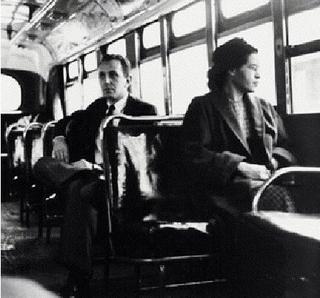 How the ironies of history sometimes work. A little more than one month before the 50th anniversary of the Montgomery Bus Boycott (Dec. 1), Rosa Parks is dead.
How the ironies of history sometimes work. A little more than one month before the 50th anniversary of the Montgomery Bus Boycott (Dec. 1), Rosa Parks is dead. Rosa Parks' is a life to which attention must be paid. Ann said to me only last week that the word "hero" is used far too often these days to describe people who don't deserve the appellation. But rarely has anyone come into the world to whom the word "hero" can more truly be applied than Rosa Parks.
Ms. Parks has made it clear that the moment in 1955 when she refused to give up her seat on the bus to a white man was an act of resistance not just the result of being tired. She was tired alright, but not just from work:
Our mistreatment was just not right, and I was tired of it,Parks wrote in her 1994 book, Quiet Strength.
I kept thinking about my mother and my grandparents, and how strong they were. I knew there was a possibility of being mistreated, but an opportunity was being given to me to do what I had asked of others.
 Rosa Parks was by no means a political novice at that moment. She had been the youth secretary for the local NAACP; she had gone to the Highlander Folk School for training in non-violent resistance; and she had earlier run into trouble on the Montgomery buses. The safe myth that she was just tired from a long day's work (which was probably also true) is both racist and sexist. It is difficult (and was particularly so in the mid-fifties) for our mainstream culture to attribute such an important historic moment to a Black woman, but there it is.
Rosa Parks was by no means a political novice at that moment. She had been the youth secretary for the local NAACP; she had gone to the Highlander Folk School for training in non-violent resistance; and she had earlier run into trouble on the Montgomery buses. The safe myth that she was just tired from a long day's work (which was probably also true) is both racist and sexist. It is difficult (and was particularly so in the mid-fifties) for our mainstream culture to attribute such an important historic moment to a Black woman, but there it is.I don't think she or anyone else could have predicted what the immediate and long-term consequences of her action would be; but it proves once again that only by saying "no" to oppression can we change the world.
As the Detroit Free Press (freep) wrote:
Speaking in 1992, Parks said history too often maintainsthat my feet were hurting and I didn't know why I refused to stand up when they told me. But the real reason of my not standing up was I felt that I had a right to be treated as any other passenger. We had endured that kind of treatment for too long.Her arrest triggered a 381-day boycott of the bus system organized by a then little-known Baptist minister, the Rev. Martin Luther King....At the time I was arrested I had no idea it would turn into this, Parks said 30 years later. It was just a day like any other day. The only thing that made it significant was that the masses of the people joined in.
The Montgomery bus boycott, which came one year after the U.S. Supreme Court's landmark declaration that separate schools for blacks and whites were "inherently unequal," marked the start of the modern civil rights movement.
And so on Dec. 1st we will remember Rosa Parks and the other true heroes of the 20th century Civil Rights revolution.
No comments:
Post a Comment